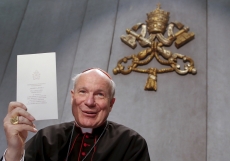An adviser to Pope Francis from his home country of Argentina was a "ghostwriter" of some of the most important passages of his new document on the family, according to the influential Rome blogger Sandro Magister
Central passages of Amoris Laetitia are based on earlier writings by Víctor Manuel Fernández, he claims.
"They are the key paragraphs," he writes. "And they are also the most intentionally ambiguous."
Crucially, he adds, they are the paragraphs of chapter eight that appear to give the go-ahead to communion for the divorced and remarried.
Magister draws similarities between texts in the encyclical and two articles from 2005 and 2006 by Fernández when he was professor of theology at the Universidad Católica Argentina in Buenos Aires. Fernández was ordained a bishop shortly after the election of Pope Francis in 2013.
Magister also quotes Fernández' first book: Heal me with your mouth. The art of kissing, published in 1995 in Argentina. The author wrote: "In these pages I would like to summarise the popular sentiment, that which people feel when they think of a kiss, that which mortals feel when they kiss. This is why I spoke for a long time with many persons who have a great deal of experience in this matter, and also with many young people who are learning to kiss in their way. Moreover, I have consulted many books and I wanted to show how the poets speak of the kiss.
"In this way, with the intention of summarizing the immense richness of life have come these pages on behalf of the kiss, which I hope may help you to kiss better, urge you to liberate in a kiss the best of your being."
Religious commentator Damian Thompson, writing in The Spectator, says Magister's claims "will severely embarrass Francis as he tries to clear up confusion over the Church's teaching on Communion for the divorced and remarried."
On the question of whether Catholics in an irregular second marriage are living in a state of mortal sin, Thompson suggests Francis borrowed his thinking from Fernández.
"Vatican sources claim that Archbishop Fernández has been boasting that he wrote parts of Amoris Laetitia. If so, they don't appear to be empty boasts," he writes.

















